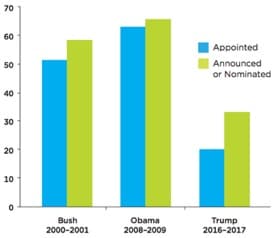Share this article
Advisory boards face upheaval in Trump administration
Many advisory boards are changing in leadership and organization under the Trump administration. These changes have drawn pushback from some board members and non-government partners.
Federal advisory boards are authorized under the Federal Advisory Committee Act to give non-government experts the opportunity to advise secretaries and administrators of various departments and independent agencies on current government research, initiatives and portfolios. Members of these groups are appointed by secretaries, independent agency leaders or the president.
The White House is coming under fire for a multitude of vacant seats on science advisory committees, especially within the Environmental Protection Agency. A recent study conducted by the Union of Concerned Scientists found that advisory committees were less staffed and met less often last year than any other year since 1997 when recording began. UCS found that two-thirds of these groups are meeting less often than they are mandated to by their own charters.

This chart shows the number of appointed and announced or nominated members of scientific advisory committees under each of the last three presidents. ©Union of Concerned Scientist
Interior Secretary Ryan Zinke has been active in reorganizing advisory boards in his department. His efforts began early in his time in office with the suspension of over 200 DOI advisory boards in May 2017 pending further review. Some of these boards have yet to resume meeting, such as the Advisory Committee on Climate Change and Natural Resource Science.
One of the advisory boards temporarily suspended was the Wildlife and Hunting Heritage Conservation Council, which advised both the Interior and Agriculture secretaries. This council, on which TWS had representation, was briefly reinstated for a fall 2017 teleconference before members were told that the body would be discontinued in December 2017. A newly created Hunting and Shooting Sports Conservation Council will have a similar charge to that of the WHHCC, with an added emphasis on recent Interior secretarial orders and the department’s support of shooting sports.
Change in other advisory boards has been more tumultuous. The National Park Service Advisory Board recently experienced a flood of resignations, as nine of the 12 members quit. In a letter to Zinke, former chairman Tony Knowles stated that the board’s “requests to engage have been ignored and the matters on which we wanted to brief the new Department team are clearly not part of its agenda.” Knowles wrote that the DOI “showed no interest in learning about what we considered the very forward-thinking goals and actions of the National Park Service for issues such as science and the effects of climate change, protecting ecosystems, education and reaching out to ethnic minorities.” This committee traditionally met twice yearly and worked in close collaboration with the secretary, but according to Knowles, it has not met once during the Trump administration.
Zinke’s tenure has also resulted in the creation of advisory boards with new missions. The International Wildlife Conservation Council is a new advisory committee, created to promote “benefits that result from U.S. citizens traveling to foreign nations to engage in hunting,” according to the DOI. Members of this new committee have not yet been appointed, but nominees include prominent members of the professional hunting community as well as firearm and ammunition manufacturers.
Read The Wildlife Society Position Statement on The Use of Science in Policy and Management Decisions.
Header Image: Many Interior Department advisory boards have experienced changes under the Trump administration. ©Matt Wade








